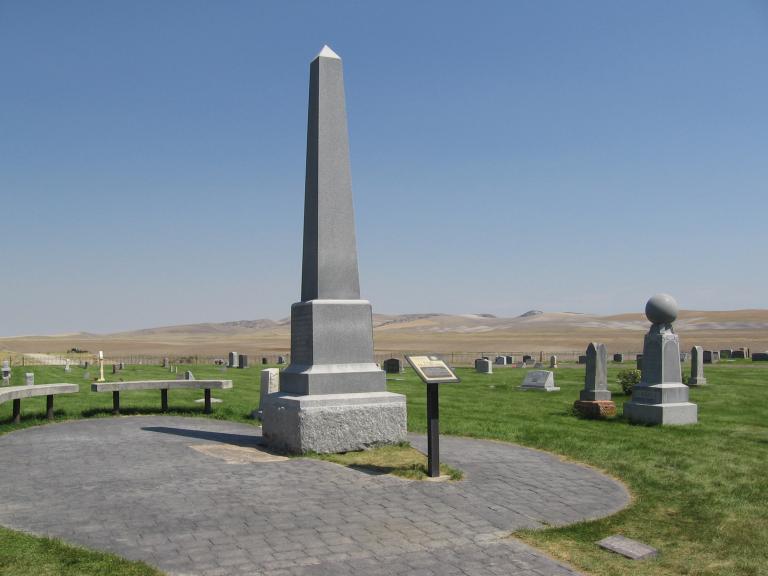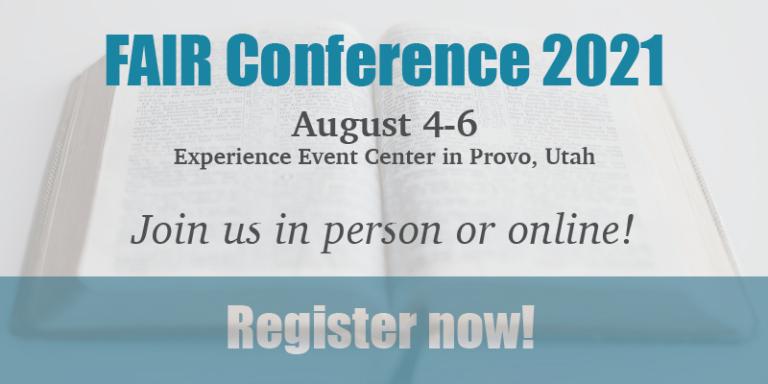
(Wikimedia Commons public domain image)
***
While we were up in Logan yesterday, my wife and I took the opportunity to visit the gravesite of Martin Harris. He was, of course, one of the Three Witnesses to the Book of Mormon, and the only one of the Book of Mormon witnesses — whether we’re speaking about the Three Witnesses, the Eight Witnesses, or the informal or unofficial witnesses — to find his way out to Utah. We felt, since we’ve devoted quite a bit of time to the Book of Mormon witnesses over the past several years (and will continue to do so for probably at least the next six months or more, especially in connection with our forthcoming two-part documentary), it would be appropriate to pay our respects to Brother Harris and to use the occasion to ponder his legacy in a slightly different way.
The cemetery in Clarkston, which is located to the northwest of Logan in Cache Valley, is beautifully situated on a prominent knoll, offering a wide view of the valley and surrounded by lovely green fields. A historical marker and an obelisk stand at Brother Harris’s burial place, which is listed on the National Register of Historic Places. The obelisk was dedicated in 1925 by Heber J. Grant, the then-president of the Church of Jesus Christ of Latter-day Saints, on the fiftieth anniversary of the Witness’s death. I recommend a visit to the cemetery at Clarkston. It’s a good place to reflect.
***

This year’s installment of the annual FAIR conference is rapidly approaching, and registration is open. As COVID seems to recede, it will be partially open to the public with generous but limited seating available, but it will also be fully available online:
Truth in advertising: There will be many fine presentations. But I will also be speaking, under the title of “The Book of Mormon Witnesses: Reality and Sincerity.” You’ve been warned.
***
“Peter Pan,” the proprietor of the very valuable Neville-Neville Land website — whom I’m betting I know but whose identity I don’t know — called my attention several days ago by email to a fascinating item from Mr. Jonathan Neville. At the time in question, Mr. Neville had not yet seen the Interpreter Foundation’s Witnesses film, but he had just posted his second review of it. Here is a portion of what he had to say:
People are asking what I think of the Witnesses movie. Because it’s not playing anywhere near where I live, I haven’t seen it.
I’m reserving judgment until I do (if I do).
It’s inspiring to see Mr. Neville reserve his judgment. Comparing Witnesses to Eber D. Howe’s 1834 Mormonism Unvailed — the mother of all anti-Mormon books — couldn’t possibly be considered judgmental. It’s an entirely charitable way, even a generous way, to depict the efforts of other active Latter-day Saints. Objective observers will certainly recognize that, as he often says of himself, Mr. Neville respects the many believing Latter-day Saint scholars who don’t share his opinion on the all-important, vital, indispensable doctrine of Book of Mormon geography.
Here is what Wikipedia says about Eber D. Howe’s book, which apparently served as the inspiration and blueprint for Witnesses:
The publication of Mormonism Unvailed is significant in Mormon history as it is considered to be the first anti-Mormon book. . . . Of the many subjects discussed in the book, two had a significantly lasting impact. The first of these was the publication of a number of affidavits and other statements related to [which is to say, attacking] the character of Joseph Smith and Martin Harris. The second significant item was the introduction of a popular early authorship theory for the Book of Mormon known as the “Spalding–Rigdon theory of Book of Mormon authorship”.
Yup. Exactly like Witnesses. Indistinguishable.
But I thought that Mr. Neville’s admirably charitable and non-judgmental description of the motives of some of his fellow active Latter-day Saints was especially charming and worthy of note:
That’s it. We’re in it for the money. I believe that Mr. Neville is accusing us of priestcraft. Non-judgmentally and respectfully, of course.
This is what the Book of Mormon has to say about priestcraft, at 2 Nephi 26:29-31:
He commandeth that there shall be no priestcrafts; for, behold, priestcrafts are that men preach and set themselves up for a light unto the world, that they may get gain and praise of the world; but they seek not the welfare of Zion.
Behold, the Lord hath forbidden this thing; wherefore, the Lord God hath given a commandment that all men should have charity, which charity is love. And except they should have charity they were nothing. Wherefore, if they should have charity they would not suffer the laborer in Zion to perish.
But the laborer in Zion shall labor for Zion; for if they labor for money they shall perish.
I will retire from serving on the faculty of Brigham Young University on 1 July. I’ve taught Islamic studies and Arabic at BYU for thirty-six years. That’s how I’ve earned my living. I don’t make a cent from my involvement in the Interpreter Foundation or from speaking at the FAIR conference. Nor does any member of my family. Quite the contrary: We’re donors. I don’t make a cent from my involvement in Witnesses. Nor does any member of my family. On the contrary, we’re donors.
Clearly, we’re in it for the money.











